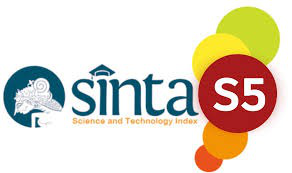Assistance for Student Entrepreneurial Character Development through Compost Fertilizer Production Activities from Household Waste
Abstract
Socialization activities on composting practices by utilizing household waste as an effort to take advantage of potential and protect the surrounding environment. This activity was carried out at Junior High School 2 Jatinangorwith the aim of creating a mindset for productive behavior and an entrepreneurial spirit from the production of compost which has high economic value. The method of implementing community service activities is carried out with training that produces skills, lecture methods, questions and answers, discussions, simulations and mentoring. The results of the activity revealed that the implementation of this composting activity was recognized by some students as an easy, simple, and beneficial practice for greening the environment. Socialization of making compost provides great benefits, namely an increase in students' knowledge about the benefits of organic waste residue as raw material for making compost. With this activity it is hoped that the impact will affect students' desire to always protect the environment and be able to apply it at home and in the environment around where they live in stages.
Keywords
Full Text:
PDFReferences
Aizuddin, N., Adam, S., & Beni. (2020). The Effectiveness of Entrepreneurship Training Programs Towards The Bumiputera Entrepreneurial Performance in Johor. International Journal of Entrepreneurship and Management Practices, 3, 74–81. https://doi.org/10.35631/IJEMP.310006
Ciptono, B., Suhandoyo, & Harjana, T. (2022). The Organic Waste Processing : Training with Vermicomposting and Bioactive Starter for Vocational High School Students. Atlantis Press SARL. https://doi.org/10.2991/978-2-494069-67-1
Gaur, A. . (1983). A Manual of Rural Composting FAO. United Nation.
Jalil, M. A. (2010). Sustainable Development in Malaysia: A Case Study on Household Waste Management. Journal of Sustainable Development, 3(3), 91–102. https://doi.org/10.5539/jsd.v3n3p91
Mardewi, N. K., Suryati, L., & Kartini, L. (2022). Handling Fruit and Vegetable Waste By Breeding BSF Larvae at the Penebel Village Waste Management Center , Tabanan. Asian Journal of Applied Research for Community Development and Empowerment, 6(3), 1–4.
Purasani, H. N., Melati, I. S., & Rahmaningtyas, W. (2019). Assistance for Entrepreneurial Character Development through Compost Fertilizer Production Activities from Household Waste in the City of Semarang. Jurnal Terapan Abdimas, 4(1), 71. https://doi.org/10.25273/jta.v4i1.3811
Rae, D. (2000). Understanding entrepreneurial learning: a question of how? International Journal of Entrepreneurial Behavior & Research, 6(3), 145–159. https://doi.org/10.1108/13552550010346497
Smith, R. M., Sardeshmukh, S. R., & Combs, G. M. (2016). Understanding gender, creativity, and entrepreneurial intentions. Education + Training, 58(3), 263–282. https://doi.org/10.1108/ET-06-2015-0044
Watts, G., Cope, J., & Hulme, M. (1998). Ansoff’s Matrix, pain and gain. International Journal of Entrepreneurial Behavior & Research, 4(2), 101–111. https://doi.org/10.1108/13552559810224567
DOI: https://doi.org/10.46336/ijeer.v3i3.424
Refbacks
- There are currently no refbacks.
Copyright (c) 2023 Ahmad Riyansyah, Abiodun Ezekiel Owoyemi, Grida Saktian Laksito, Mariyan Yurechko
Published By:
IJEER: Jalan Riung Ampuh No. 3, Riung Bandung, Kota Bandung 40295, Jawa Barat, Indonesia
IJEER Indexed By:
 This work is licensed under a Creative Commons Attribution 4.0 International License.
This work is licensed under a Creative Commons Attribution 4.0 International License.









